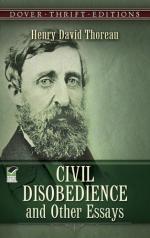
|
| Name: _________________________ | Period: ___________________ |
This test consists of 15 multiple choice questions and 5 short answer questions.
Multiple Choice Questions
1. What kind of issue did Thoreau say slavery was NOT?
(a) Physical.
(b) Moral.
(c) Political.
(d) Emotional.
2. What does Thoreau say he is NOT in 'Civil Disobedience'?
(a) A socialist.
(b) An anarchist.
(c) A democrat.
(d) A monarchist.
3. Where was Anthony Burns from?
(a) New York.
(b) Virginia.
(c) West Virginia.
(d) Massachusetts.
4. How does Thoreau begin 'Civil Disobedience'?
(a) He relates an experience.
(b) He cites a scripture.
(c) He reads a poem.
(d) He gives a motto.
5. What did Thoreau say most media devices were striving to do?
(a) Gain approval.
(b) Make money.
(c) Reflect the truth.
(d) Appease the masses.
6. Who did Thoreau say was running the military force in Massachusetts?
(a) Loring.
(b) Burns.
(c) Harrison.
(d) Tuttle.
7. What does Thoreau say happens when government gets involved in trade and commerce?
(a) It changes the perspective.
(b) It simplifies things.
(c) It allows for growth.
(d) It gets in the way.
8. What were Abolitionists against?
(a) Socialism.
(b) War.
(c) Change.
(d) Slavery.
9. What does Thoreau hope to inspire men to do after 'Civil Disobedience'?
(a) Stand for what they believe.
(b) Not pay their taxes.
(c) Vote.
(d) Vote for emancipation.
10. What was the congressional act that was discussed at the meeting Thoreau was asked to speak at before giving his speech, 'Slavery in Massachusetts' about?
(a) Slavery.
(b) States' rights.
(c) Presidential campaigns.
(d) Territorial issues.
11. Where was Edward Loring from?
(a) Washington D.C.
(b) Philadelphia.
(c) Augusta.
(d) Boston.
12. How does Thoreau say a citizen should disobey?
(a) Vote.
(b) Withdraw support.
(c) Speak out in public.
(d) Move away.
13. How does Thoreau say soldiers are expected to perform their duties?
(a) Obediently.
(b) Mindlessly.
(c) Intelligently.
(d) Faithfully.
14. What part of man does Thoreau say government can NEVER manipulate?
(a) The emotional part.
(b) The moral part.
(c) The intelligent part.
(d) The physical part.
15. What did Thoreau say law would never do for man?
(a) Repress bad men.
(b) Keep men safe.
(c) Govern him.
(d) Set him free.
Short Answer Questions
1. What does Thoreau call the congressional act that was discussed at the meeting he was asked to speak at before giving his speech, 'Slavery in Massachusetts'?
2. Who is Thoreau condemning in 'Slavery in Massachusetts'?
3. How does Thoreau describe the attack made to free Burns?
4. What did Thoreau warn the people against in 'Slavery in Massachusetts'?
5. Why does Thoreau blame the citizens of his state for slavery?
|
This section contains 402 words (approx. 2 pages at 300 words per page) |

|




